Reviews
Ralph Bakshi
USA, 1981
Credits
Review by Glenn Heath Jr.
Posted on 21 April 2011
Source Sony DVD
Categories Ralph Bakshi’s Cool Worlds
Scanning the vast forests of American history you’d be hard-pressed to find a perfectly linear family tree. People misremember experiences, relatives fade from memory, and families bury traumas in the sand, serving each generation a strong cocktail equal parts nostalgia and uncertainty when considering the sepia-toned faces populating their photo albums. Traditions and memories are passed down, but so are gaps and inconsistencies, and often the “truth” resides in these uncomfortably dark corners. In this sense, America is not just a melting pot of cultures, but of conflicting experiences as well, a collective of overlapping identities that, for better or worse, likes to imagine the past in definite terms. There’s a certain comfort in completing a picture of what’s come before, and Hollywood films often sooth us into believing difficult questions about the past have finite answers. But our impressions are inherently unreliable and problematic, our point of views tainted by crippling subjectivity. This tension between perception and reality, past and present, brings up a crucial question for viewers and filmmakers alike: how can we make sense of our respective bloodlines without romanticizing or marginalizing them?
Ralph Bakshi’s American Pop obsesses over this dilemma of remembrance by merging one Russian Jewish family’s constantly shifting timeline with fluid impressions of key 20th century events. Bakshi melds the personal travails of his characters into a disjointed universal discourse, avoiding precise conclusions about any of their experiences in favor of a more hypnotic, almost mystical examination of memory. Aesthetically, the film is a divergent duck, where various shades of the American Dream reflect a tapestry of contradictory and jarring aesthetics including signs, symbols, dream logic, animation, still photography, live action footage, painting, sketches, and alternate historiographies. Bakshi utilizes different mediums to create a jigsaw puzzle around his characters, a landscape of quicksand slowly sinking into the history books. We get a glimpse of a moment right before it disappears forever, and our fractured impressions of the filmed event begin to mirror those of the four generations of men represented in the film.
Like a nickelodeon frantically looping lost footage from Eisenstein’s Potempkin, the opening sequence of American Pop is a staggering ideological assault. Sometime in the 1890’s, a frigid Russian town is torn apart by invading Czarist Cossacks, sending Jewish peasants running for the hills. Young Zalmie and his mother barely escape, but his Rabbi father is slaughtered after refusing to stop a prayer despite the violence. Peppered with inter-titles and sharp contrasts in color, Zalmie’s near death experience not only introduces a key narrative motif of survival, but also the crucial animation style (rotoscoping) Bakshi develops and subverts as the story unfolds. The crisp white snow of the Russian tundra, the bright orange fire from the burning town, and the panicked contortions of the fleeing peasants all take on a heightened spastic energy, something specifically tied to the film’s visual relationship between background and foreground. The former provides a still, painterly template for the rapid-fire movement of the latter, making it seem like the dense mise-en-scene is being pulled apart in two separate directions.
An arduous boat ride to the United States leads Zalmie and his mother to the dizzying lights of New York City circa early 1900’s. Destitution and desperation rest alongside extreme wealth, and Bakshi’s animation style continues to illuminate these very different experiences intrinsically overlapping from frame to frame. The schlock performances of vaudeville instantly attract Zalmie, who reveals a flair for marketing and distribution after getting a job from a local promoter named Louis. Bakshi allows these early moments a quiet innocence, even when Zalmie is surrounded by the vice of adulthood. However, like every segment in American Pop, childhood doesn’t last long, suddenly transitioning forward without any warning. Zalmie’s mother is killed in the infamous Triangle Shirtwaist Factory fire in 1911 (brutally conveyed in sharp visual bursts of action), and the innocent boy looking over his mother’s covered body turns into a jaded young man in one dissolve. Bakshi continuously distorts editing styles and conventional montages to aggravate temporality, revealing both distrust for cinematic recreation while highlighting the necessary gaps hindering every family history.
Through the seamlessly progressing life of Zalmie, who becomes a successful promoter, gets embroiled with gangsters, marries a dancer, and has a child named Benny, American Pop reveals itself as a mosaic of many experiences, not just a single character study. Zalmie’s stagnation in a life of crime leads the film to Benny’s youthful perspective, who grows up amid the Great Depression to become a jazz piano player, something his father resents. As Benny plays the piano with a band of black musicians in a seedy nightclub, a disappointed Zalmie pleads, “If you won’t live my dreams, then live my life.” Benny listens to his father’s conformist desires, marrying the daughter of a gangster before enlisting in the military at the dawn of WWII. This is a crucial narrative turning point, with Bakshi juxtaposing images of dream-like swing dancing with the horrific sound and fury of intense combat. The machine gun fire, airplane strafing runs, and tank rounds finally come to a halt when Benny enters a bombed out building and finds a piano. He starts playing and his beautiful notes bring a calming elegance to the war-torn atmosphere. It also attracts the attention of a German soldier hiding behind the rubble. The German points his weapon at Benny and says, “Danke”, before riddling his body with bullets. The piano is torn apart by the impact, sending a clear symbolic message to the viewer in the process: Benny survives all the hell in the world, only to fall when a flicker of his true self contrasts with the impressions of others.
Benny’s tragic death sends American Pop into a narrative tailspin, leaving his own baby son, Tony, fatherless and destined to grow up riddled with uncertainty about his place in the family tree. This event also speaks to Bakshi’s increasing desire to leave traumatic events uniformly unsettled, lingering in the minds of survivors for years on end. There is no closure for anyone, just more experiences to muddy the already obscure water. Tony grows up caught between the white picket fences of the baby-boom generation and the free spirit hive mind of the 1960’s, a self-proclaimed beat nick and lazy troublemaker. Finally, Tony leaves the androgynous confines of suburbia for the road in an attempt to construct his own history, drifting aimlessly from one small town to the next like a boyish Sal Paradise. More mashed up montages propel Tony further westward to San Francisco, where he hooks up with a collective of hippies and becomes a songwriter for their band, penning songs from various rock star canons (Bob Dylan, The Doors, Mama’s and the Papas). Bakshi’s hallucinatory focus becomes loony at this point, mimicking the mental impact of the drugs and alcohol these characters devour. Flashes of light and sound bounce off images of the Vietnam War (both archival footage and animation), yet Tony and his brood is completely entranced by their own selfish need to feel something. Tony experiences the high of artistic creation and the low of numbing, indifferent betrayal, and soon he can’t tell the difference between the two. Like his grandfather and his father before him, Tony’s quest for fulfillment leaves him broken and bewildered, just another separate part of a unknowable whole that can’t be completed because of missing links in his identity.
American Pop’s procession of fathers and sons is completely severed in the final coupling of Tony and Pete, a boy who may or may not be his child from a one night tryst he had with a waitress in Kansas years before. While visiting the Midwest with the now uber-popular but disintegrating rock band he helped create, Tony meets Pete backstage, the young boy looking on from the periphery much the same way Zalmie admired the vaudeville performers decades before. Tony and Pete’s roller-coaster relationship, a mentor/disciple war of attrition that takes them to New York City where the younger boy inherits his father’s drug dealing operation, is by far the most complex in the film. Mired in desperation, the last act of American Pop is a stirring whirlpool of cyclical cues that connects each of the previous generations. By the time Tony abandons his son and Pete grows up to be a fantastical 1980’s pop star, Bakshi’s aesthetic falls so far down the rabbit hole one can only see the ending as tragically absurd. Sense of self has permanently been ingratiated by popular culture, and Frankie is the exclamation point on Bakshi’s assertion that by the time we grow up, all sense of personal or collective history is muted by deafening, often selfish experiences of the present.
As an example of historical revisionism, American Pop takes on many paradoxical identities to show the inadequacies of cinematic recreation. But Bakshi’s ornate opus is far more essential as a personal opium dream passed on from one generation to the next by children of men destined to follow in their father’s footsteps. Interestingly, the mothers of American Pop either die or completely disappear into the status quo, another telling absence of history that demands further consideration. Despite the glaring gaps of time, the tragic deaths, and the debilitating decisions made be each man in this particular history, the essence of the family tree carries on. Zalmie, Benny, Tony, and Pete might represent different moments in time and suffer from extreme emotional and ideological distance, but they are blood, connected by an invisible chain neither they, nor the medium of cinema can fully understand. American Pop is Bakshi’s strange and unsettling declaration of independence from the untruths of linearity, a feverish incomplete rock anthem for the disaffected youth in all of us.
More Ralph Bakshi’s Cool Worlds
-
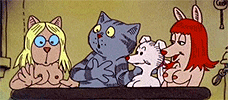
Fritz the Cat
1972 -
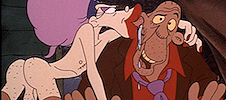
Heavy Traffic
1973 -
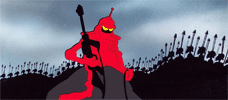
Wizards
1977 -

The Lord of the Rings
1978 -
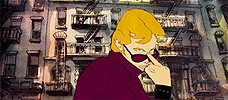
American Pop
1981 -

Hey Good Lookin’
1982 -
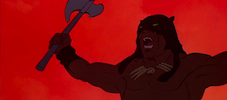
Fire and Ice
1983 -

Mighty Mouse: The New Adventures
1987–1988 -

Cool World
1992 -
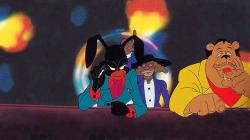
Coonskin
1975
We don’t do comments anymore, but you may contact us here or find us on Twitter or Facebook.



